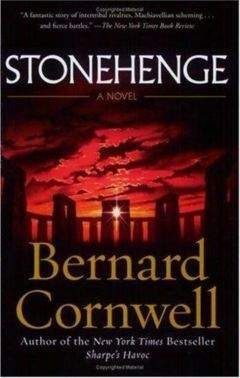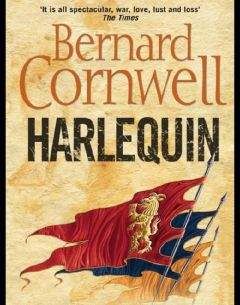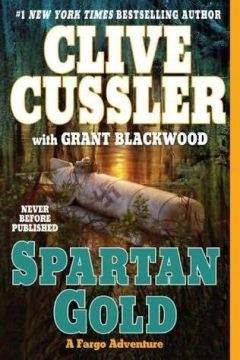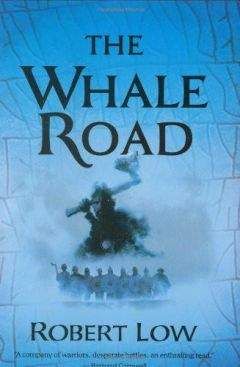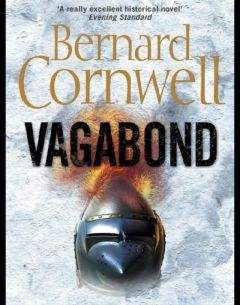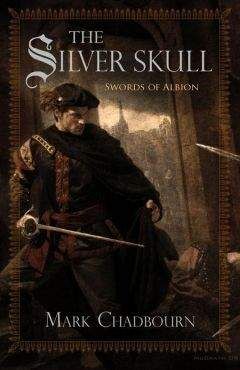Galeth could have cried for pity at the boy's pathetic boast. Camaban's bed was a pile of soaking bracken, beside which lay his few belongings: a fox's skull, a broken pot and a raven's wing. His only clothing was a rotting sheep's pelt that stank like a tanner's pit. 'So no one knows that you live here?' Galeth asked.
'Only you,' the boy said trustingly. 'I haven't even t-t-told Saban. He brings me food sometimes, b-b-but I make him take it to the river.'
'Saban brings you food?' Galeth asked, surprised and pleased. 'And you say Slaol talks to you here?'
'Every d-d-day,' Camaban stuttered.
Galeth smiled at that nonsense, but Camaban did not see for he had turned and reached further into the leaves where, from a hiding place, he brought out a short bow. It was an Outfolk bow, the stranger's bow with its wrappings of sinew lashed about the strips of wood and antler. 'L-L-Lengar used it last night,' Camaban said. 'The m-m-man was d-d-dying anyway.' He paused, looking worried. 'Why does H-H-Hirac want me?' he asked.
Galeth hesitated. He did not want to say that Camaban was to be sacrificed, though there could be no other reason for Hirac's demand.
'He wants to k-k-kill me,' Camaban said calmly, 'doesn't he?'
Galeth nodded reluctantly. He wanted to tell his outcast nephew to run away, to go west or south into the woods, but what good would such advice do? The child would die anyway, caught by beasts or captured by slavers, and it would be better if he were given to Lahanna. 'You will go to the goddess, Camaban,' Galeth said, 'and you'll become a star and will look down on us.'
'When?' Camaban asked, seemingly unmoved by his uncle's promise.
'Tomorrow, I think.'
The boy gave Galeth a mischievous grin. 'You c-c-can tell Hirac that I'll b-b-be at Ratharryn in the morning.' He turned to push the precious bow back into its hiding place. Other things were concealed there: the stranger's empty quiver, a snake's skin, the bones of a murdered child, more bones that had small marks scratched on their flanks and, most precious of all, two of the small golden lozenges that Camaban had retrieved while Lengar had pursued Saban. Now he took those lozenges and held them tight in his fist, but did not show them to Galeth. 'You think I'm a fool,' he asked, 'don't you?'
'No,' Galeth said.
'B-b-but I am,' Camaban said. He was Slaol's fool, and he dreamed dreams.
But no one took any notice, for he was crippled. So they would kill him.
—«»—«»—«»—
Next morning Neel had two men dig a shallow grave in Lahanna's temple, just beside the outer ring of poles. It was, the men agreed, an auspicious day for the sacrifice for the clouds that had trailed the storm were thinning fast and Lahanna was showing her pale face in Slaol's sky. A few darker clouds appeared as the crowd gathered about the temple's five rings and some feared that Hirac would delay the sacrifice, but he must not have been concerned about the clouds for at last the dancers appeared from the high priest's hut. The dancers were women who carried leafy ash branches with which they swept the ground as they capered ahead of the seven priests whose naked bodies had been whitened with the slurry of chalk in which finger patterns swirled. Hirac wore a pair of antlers tied to his head with leather laces and the horns tossed dangerously as he danced behind the women. A ring of bones circled his waist, more bones hung from his mud-crusted hair, and a shining talisman of amber dangled at his neck. Neel, the youngest priest, played a flute made from the leg bone of a swan and its notes skittered wildly as he danced. Gilan, who was next oldest after Hirac, led Camaban by the hand. The boy had been allowed back into Ratharryn for this one day, and while he was inside the embankment the women had woven flowers into his black hair that had been untangled with bone combs so that it now fell straight to his thin waist. He too was naked, and his washed skin looked unnaturally clean. The red mark of Lahanna showed on his flat belly. Like Hengall's other two sons he was tall, though each time he stepped on his left foot his whole body made a grotesque twisting dip. Hengall and the tribe's elders followed the priests.
Four men began to beat wooden drums as the procession approached, and the tribe, ringing the temple, began to dance. At first they just swayed from side to side, but as the drummers increased the speed of their beating they stepped sunwise about the circle. They paused only to make way for the priests and the elders and, once the procession had passed through them, the dancing ring closed up.
Only the priests and the victim were allowed through the gap in the shallow bank that ringed the temple. Hirac was first, and he went to the newly dug grave where he howled up at the faded moon to draw the goddess's attention while Gilan led Camaban to the circle's far side as the other priests capered about the temple rings. One held the tribe's skull pole high so that the ancestors could see what important thing was being done in Ratharryn this day, while another carried the massive thigh bone of an aurochs. One end of the bone was a gnarled and knobbly mass that had been painted with red ochre. It was the tribe's Kill-Child, and the watching children, who danced with their parents to the beat of the drums, eyed it warily.
Hengall stood in the temple entrance. He alone did not dance. At his feet lay gifts for the goddess: a stone mace, an ingot of bronze and an Outfolk jar with its pattern of cords pressed into the clay. The priests, who did no work in the fields and raised no flocks or herds, would keep those gifts and trade them for food.
The tribe danced until their legs were tired, until they were almost in a trance induced by the drums and by their own chanting. They called Lahanna's name while the sweepers, who had driven away any spirits that might try to intrude on the ceremony, dropped their ash branches and began to sing a repetitive song that called on the moon goddess. Watch us, they sang, see what we bring to you, watch us, and there was happiness in their voices for they knew that the gift would bring pleasure to the goddess.
Hirac danced with closed eyes. The sweat was making runnels through the chalked pattern on his skin and it seemed, in his ecstasy, as though he might fall into the newly dug grave, but he suddenly became still, opened his eyes, and howled again at the moon that still glimmered between the white clouds.
A quiet dropped on the temple. The dancers slowed and stopped, the song faded, the drummers rested their fingers and Neel let the swan-bone flute fall silent.
Hirac howled again, then reached out with his right hand and took the Kill-Child. The priest with the skull pole moved close behind the high priest so that the ancestors could see all that happened.
Gilan urged Camaban forward. No one expected the boy to go willingly, but to their surprise the naked youth limped unhesitatingly towards the grave and a sigh of approval sounded from the tribe. It was better when the sacrifice was willing, even if the willingness did come from stupidity.
Camaban stopped beside his grave, exactly where he was supposed to stop, and Hirac forced a smile to soothe any fears the boy might have. Camaban blinked up at the priest, but said nothing. He had not spoken all day, not even when the women had hurt him by tugging at the knots in his hair with their long-toothed combs. He was smiling.
'Who speaks for the boy?' Hirac demanded.
'I do,' Hengall growled from the temple's entrance.
'What is his name?'
'Camaban,' Hengall said.
Hirac paused, angry that the ritual was not being observed. 'What is his name?' he called again, louder this time.
'Camaban,' Hengall said, and then, after a pause, 'son of Hengall, son of Lock.'
A cloud covered the sun, casting a shadow over the temple. Some in the tribe touched their groins to avert ill luck, but others noted that Lahanna still showed in the sky.
'Who has the life of Camaban, son of Hengall, son of Lock?' Hirac demanded.
'I do,' Hengall said, and opened a leather pouch that hung from his belt and took from it a small chalk ball. He gave it to Neel who carried it to Hirac.
The ball, no larger than an eye, was the token carved at the birth of a child which was destroyed when the child became an adult; until then it was the possessor of the child's spirit. If the child died the ball could be ground into dust, and the dust mixed with water or milk and then drunk so that the spirit would pass to another body. If the child vanished, snatched by the spirits or by an Outfolk hunting party seeking slaves, then the ball might be buried by a temple post so that the Gods would offer the missing child protection.
Hirac took the ball, rubbed it in his groin, and then held it high in the air towards the moon. 'Lahanna!' he cried. 'We bring you a gift! We give you Camaban, son of Hengall, son of Lock!' He threw the ball onto the grass beyond the grave. Camaban smiled again, and for a moment it looked as though he might lurch forward and pick it up, but Gilan whispered at him to be still and the boy obeyed.
Hirac stepped over the grave. 'Camaban,' he shouted, 'son of Hengall, son of Lock, I give you to Lahanna! Your flesh will be her flesh, your blood her blood and your spirit her spirit. Camaban, son of Hengall, son of Lock, I cast you from the tribe into the company of the goddess. I destroy you!' And with those words he raised the Kill-Child high over his head.
'No!' a frightened voice called, and the whole astonished tribe looked to see that it was Saban who had spoken. The boy seemed aghast himself, for he placed a hand over his mouth, but his distress was plain. Camaban was his half-brother. 'No,' he whispered behind his hand, 'please, no!'
Hengall scowled, but Galeth put a comforting arm on Saban's shoulder. 'It has to happen,' Galeth whispered to the boy.
'He's my brother,' Saban protested.
'It has to happen,' Galeth insisted.
'Quiet!' Hengall growled, and Lengar, who had been sullen ever since his loss of face the previous morning, smiled to see that his younger brother was also out of favour with their father.
'Camaban,' Hirac shouted, 'son of Hengall, son of Lock, I give you to Lahanna!' Annoyed by Saban's interruption, he brought the great bone club down so that its ochred end smashed the chalk ball into fragments. He pounded the fragments into dust, and the watching crowd moaned as Camaban's spirit was thus obliterated. Lengar grinned, while Hengall's face showed nothing. Galeth flinched and Saban was weeping, but there was nothing they could do. This was business for the gods and for the priests.
'What is the boy's name?' Hirac demanded.
'He has no name,' Gilan responded.
'Who is his father?' Hirac asked.
'He has no father,' Gilan said.
'What is his tribe?'
'He has no tribe,' Gilan intoned. 'He does not exist.'
Hirac stared into Camaban's green eyes. He did not see a boy, for the boy was already dead, his life-spirit shattered and crushed into white dust. 'Kneel,' he ordered.
The youth obediently knelt. To some of the tribe it seemed odd that such a tall youth was to be killed by the aurochs' bone, but, other than Saban, few in Ratharryn regretted Camaban's death. Cripples brought ill luck, so cripples were better dead, to which end Hirac raised the Kill-Child high above his head, looked once at Lahanna then down to Camaban. The high priest tensed to give the killing blow, but never gave it. He was motionless, and there was a sudden horror on Hirac's face, and the horror was compounded because at that moment a rift opened in the clouds covering Slaol and a beam of sunlight lanced into the temple. A raven settled on one of the tallest poles and called loudly.
The Kill-Child quivered in Hirac's hands, but he could not bring it down.
'Kill it,' Gilan whispered, 'kill it!' But Gilan was standing behind Camaban and he could not see what Hirac could see. Hirac was staring down at Camaban who had stuck out his tongue and on the tongue were two slivers of gold. Outfolk gold. Slaol's gold.
The raven called again and Hirac looked up at the bird, wondering what its presence portended.
Camaban tucked the gold pieces back into his cheek, wet a finger and dabbed it into the powdered chalk of his soul. 'Slaol will be angry if you kill me,' he said to Hirac without stuttering, then he licked the chalk off his finger. He collected more, assembling his shattered spirit and eating it.
'Kill it!' Neel screamed.
'Kill it!' Hengall echoed.
'Kill it!' Lengar called.
'Kill it!' the crowd shouted.
But Hirac could not move. Camaban ate more chalk, then looked up at the priest. 'Slaol commands you to spare me,' he said very calmly, still without any stutter.
Hirac stepped back, almost into the grave, and let the Kill-Child fall. 'The goddess,' he announced hoarsely, 'has rejected the sacrifice.'
The crowd wailed. Saban, his eyes full of tears, was laughing.
And the crooked child went free.
There was fear in Ratharryn after the failed sacrifice for there were few omens worse than a god rejecting a gift. Hirac would not say why he had refused to kill the child, only that he had been given a sign, then he took himself to his hut where his wives claimed he was suffering from a fever, and two nights later those same wives wailed in the darkness because the high priest was dead. They blamed Camaban, saying the cripple had cursed Hirac, but Gilan, who was now Ratharryn's oldest priest, claimed that it had been a nonsense trying to kill a child marked with Lahanna's sign. Hirac had only himself to blame, Gilan said, for Hirac had woefully mistranslated the message of the gods. The gold had gone to the Old Temple and that was surely a sign that Slaol wanted the temple remade. Hengall listened to Gilan, who was a cheerful, efficient man, but distrusted because of his admiration for Cathallo. 'In Cathallo,' Gilan urged Hengall, 'they have one great temple for all the gods and it has served them well. We should do the same.'
'Temples cost treasure,' Hengall said gloomily.
'Ignore the gods,' Gilan retorted, 'and what will all the gold, bronze and amber in the world do for you?'
Gilan wanted to be high priest, but age alone would not give him that honour. A sign was needed from the gods and all the priests were seeking signs before, together, they would choose one of their number to succeed Hirac. Yet all the signs seemed bad for in the days following the failed sacrifice the warriors of Cathallo became ever bolder in their forays into Ratharryn's territory. Day after day Hen-gall heard of stolen cattle and pigs, and Lengar argued that the war drum should be sounded and a band of spearmen sent north to intercept the raiders, but Hengall still shied away from war. Instead of sending spears he sent Gilan to talk with Cathallo's rulers, though everyone knew that really meant talking to Sannas, the terrifying sorceress. Cathallo might have a chief, it might have great war-leaders, but Sannas ruled there, and many in Hengall's tribe feared that she had put some curse on Ratharryn. Why else had the sacrifice failed?
The omens became worse. A child drowned in the river, an otter tore apart a dozen fish-traps, a viper was seen in Arryn and Mai's temple, and Hengall's new wife miscarried. Grey bands of rain swept from the west. Gilan returned from Cathallo, spoke with Hengall, then walked north again; the tribe wondered what news the priest had brought and what answer Hengall had returned to Cathallo, but the chief said nothing and the folk of Ratharryn went on with their work. There were pots to be made, flints to be dug, hides to tan, pigs to herd, cattle to milk, water to fetch, buildings to repair, willow fish-traps to be woven and boats to be hacked out of the vast forest trees. A trading party arrived from the southern coast, their oxen laden with shellfish, salt and fine stone axes, and Hengall took his levy from the men before letting them travel north towards Cathallo. Hengall buried one of the axes in Slaol's temple and another in Lahanna's, but the gifts made no difference for the next day wolves came to the high pasture and took a heifer, three sheep and a dozen pigs.
